Veterinary Entrepreneurship Academy Opens Doors for CVM Veterinary Students
Story by Margaret Preigh, CVMBS Communications
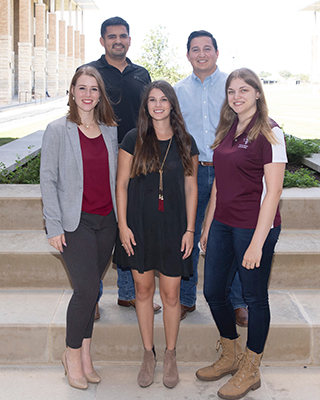
Veterinary medicine is an increasingly complex field with a diverse range of career options. For five students from the Texas A&M College of Veterinary Medicine & Biomedical Sciences (CVM), this summer allowed them to explore the intersection of veterinary medicine and entrepreneurship through the Veterinary Entrepreneurship Academy (VEA).
The VEA is a 10-week summer program that creates an immersive, high-impact experience allowing students to receive a robust business education through a collaborative, web-based platform focused on the fundamentals of entrepreneurship.
Since the summer of 2016, the VEA has connected veterinary students with startup companies through concurrent paid internships at some of the most innovative veterinary and pet health companies across North America.
These provide students with hands-on experience with business practices and innovation, while also allowing the students to actively apply the concepts and principles they’re learning throughout the program through a rigorous curriculum that educates students on topics including business fundamentals, finance, and how to build a venture of one’s own.
The program also provides the opportunity for students to enter an entrepreneurship competition called “The IDEA,” during which pairs of students are challenged to pitch their business idea to improve the veterinary field. Last year’s $10,000 grand prize was awarded to Texas A&M’s Stephanie Young and Brianna Boyle Armstrong, 2018 VEA alumnae, for their SKYPaws pet vitals monitoring device.
Registration for the 2020 VEA cohort is now available at www.vea.vet.
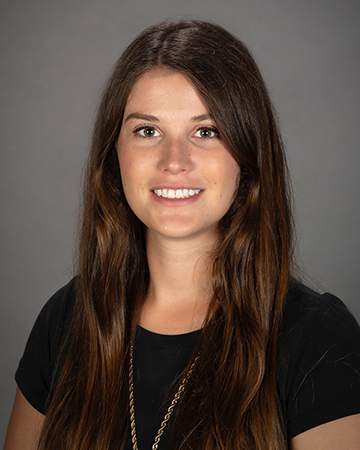
Shelby Stephens
Shelby Stephens, a third-year veterinary student from Friendswood, says the VEA opened her eyes to the diversity of careers available to DVM graduates.
“I learned that there are a lot of different things you can do with veterinary medicine degrees, which is really cool,” she said. “I never realized how many people go to veterinary school and then end up working in startups or even go on to own a bunch of other businesses.”
Paired with the company drip.vet, Stephens worked to create content for online courses targeted toward other veterinary students and DVMs seeking continuing education. While curating lessons, Stephens gained experience in new areas.
“I learned about finances, budgeting, contract negotiation, and things like that,” she said. “I had also been interested in learning how to use different website programs and learning software management and Photoshop, so I got to do that as well.”
Exploring the business world through the VEA gave Stephens insight into the current state of veterinary medicine, as well as how practices might be run in the future.
“I don’t feel like some clinics are really recognizing the potential in using technology for building their business,” she said. “You can kind of see some of that starting to pop up with the startups that we were learning about and paired with.”
Stephens sees the skills she learned this summer with drip.vet and the VEA as a valuable tool for her future as a veterinarian.
“I think the VEA definitely will be really helpful in including on my resume when I start looking for jobs,” she said. “I’m interested in private practice, but I know with some of the bigger clinics where there’s seven or eight veterinarians, they definitely are looking for these kinds of skills with websites and other things I learned through the VEA.”
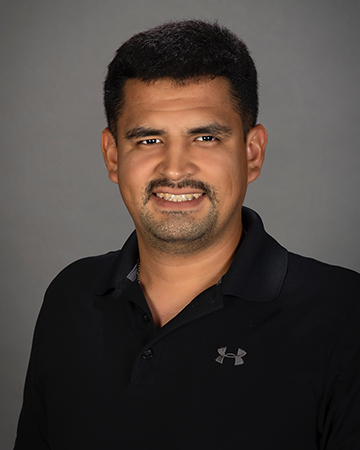
Arturo Pinon-Velasquez
Arturo Pinon-Velasquez, a third-year veterinary student from Dallas, entered the VEA with previous business experience and the desire to expand his knowledge.
“I had a lawn business when I was younger, and then I sold cars,” he said. “When I got into veterinary school, I knew I wanted to own a practice, but there are a lot of things that I didn’t know, like the specifics of how to create a business plan and how to keep going and growing.”
Pinon-Velasquez gained practical experience with two companies this summer, Animal Care Technologies and Relief Services for Veterinary Practitioners. He characterizes his time with both as hands-on and informative.
“I think doing a lot of that customer outreach for these companies, talking to clients and the client communication, growing your business, figuring out what am I doing wrong? What am I doing right? How do I make your experience better? were all things that that’ll make me as a practitioner, and hopefully as a clinic owner, more effective,” he said.
Pinon-Velasquez has put what he learned in the VEA to work, partnering with fellow student Shelby Stephens for The IDEA competition, in which students are challenged to produce an original business idea. Pinon-Velasquez’s pitch is for dehydrated pet food.
“I thought, ‘What if you had these little portable size pouches of food that were ounces instead of pounds and that made it easier to carry in your backpack? Then you can take your pet wherever you want, and just use a little bit of water to rehydrate. And what if that was something that could sustain your pet for weeks on end?’” he said.
Pinon-Velasquez’s vision caught on with Stephens and they spent the remainder of their summer growing this idea.
“We basically made an outline of our idea,” he said. “What we’re going to be working on is creating a business model canvas for it. That way we have steps for what we want to do or where we want to distribute it, how much would it cost, and who we need to partner with in order to get our idea moving onto the next step.”
This September, Pinon-Velasquez and Stephens will find out whether or not they have made it to the next stage in The IDEA competition, which continues into March. Regardless of the results, Pinon-Velasquez is adamant that the VEA was a formative experience.
“I think the VEA was a really good experience, and it gave me a lot of skills that I didn’t have or I needed to develop when I didn’t know how to develop them,” he said. “Anybody that’s interested in doing any kind of business whatsoever, whether it’s personal finance or creating your own business, could benefit from this program.”
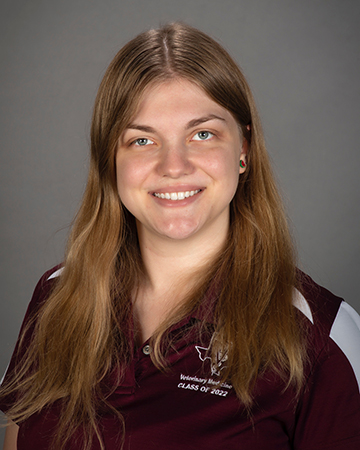
Jennifer Nary
Jennifer Nary, a second year veterinary student from New Jersey, spent her summer with the VEA working in a new environment where she found more confidence in her long-standing goals.
“The program hasn’t changed my goals, but more strengthened them and validated that, yes, veterinary medicine is actually what I want to do, and now I have some semblance of an idea of how to start doing what I want,” she said.
Nary completed her internship with the Center for Educational Technologies (CET), housed within the CVM, where she worked to market an online content-offering system that helps instructors create their own learning materials. During her time there, Nary was conscious of how her internship related to concepts she was learning in the VEA course.
“I worked on learning their customer segments, how they priced their pricing models, marketing the program, and all different aspects of the company. I tried to learn what goes into taking a product or a company from a startup to actually having customers and marketing to people.”
This experience went beyond education for Nary, who felt as though the CET viewed her as a valued member of their team.
“The VEA was a lot more immersive than I was picturing,” she said. “The company really seemed to take advantage of me being in this program and actually gave me business experience and knowledge about what they were doing, as opposed to just putting me in a corner and saying, ‘We need all these papers filed, can you do this?’”
Nary credits her summer in the VEA as productive, emphasizing the hands-on nature of her internship and the sense of belonging she found within her team.
“You get to be a valued member of this company and have a chance for your opinions and your knowledge to be working in the real world and to make a difference at these companies,” she said. “You also get to be an integral part of a team and learn about how the business is actually being run.”
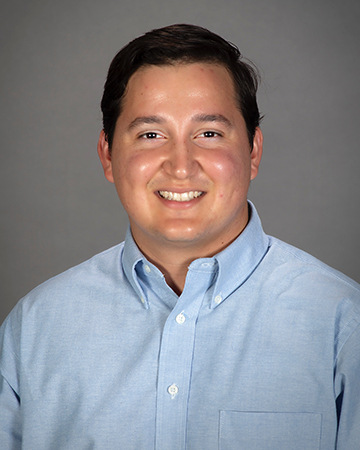
Jorge Chavarria
Jorge Chavarria, a second-year veterinary student from Laredo, began the summer knowing what his career goals were but not knowing how to enact them. He decided to enter the VEA program after a conversation with VEA Director Dr. Robert Trimble.
“I’d like to own my own practice, but I had no clue how to run a business. I have this dream, but I didn’t know how to get there. Dr. Trimble said, ‘This is what you need to do.’ He said, ‘If I would’ve had this opportunity a couple years before I graduated, I’d be that much more ahead of my colleagues,’” Chavarria said.
Chavarria completed his internship with National Veterinary Associates, where he worked on a number of projects that built his skills in communication, systems analysis, and presentation of research. What struck him most was how much responsibility these companies trusted him with as an intern.
“Things were prepared for me. On the first day, I already had a list of appointments that I needed to go to, meetings that I had to do,” he said. “Not only that, but when meeting with my point of contact and having discussions with them, it felt like my opinion was really valued. That was the first time for me where I was like, ‘Wow, somebody’s actually listening.’”
Though this summer was rewarding for Chavarria, he would not characterize it as easy.
“This is an internship that is going to make you uncomfortable. This is an internship that’s going to make you think outside the box and get outside your comfort zone,” he said. “It will push you to think differently, or push you to really see the different opportunities that veterinarians have.”
Now that Chavarria has completed the program, he feels more confident in both his desire to pursue veterinary medicine, and in his ability to do so.
“It reassured me that this is what I want to do,” he said. “I’ve found my passion, I enjoyed doing it, and the VEA gave me the principles, just the tools that I need to go and to learn more.”
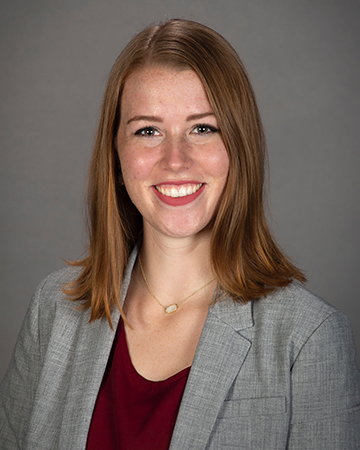
Kayla Corey
Kayla Corey is a second-year veterinary student from Krum who grew up near the world of business, though she never expected business to be a part of her career as a veterinarian.
“My dad has owned multiple businesses throughout my life,” she said. “I never really thought I would own a business because I was going into veterinary medicine more for the animal aspect of it and to save animals’ lives. That’s what I want to do.”
Through the VEA and her partnership with Furbo Dog Camera, Corey was able to combine her long-held love of veterinary medicine with a new interest in entrepreneurship, something she thinks will set her apart from her peers.
“Everybody’s been in the clinics, everybody’s been a technician, but going and doing the VEA is a really cool experience,” she said. “Just to open your doors a little bit and say, ‘Hey, I’ve done this.’”
With the experience she has gained over the summer, Corey is confident that she can better navigate the veterinary field and help veterinary clinics make more informed business decisions.
“Some clinics—a lot of clinics—aren’t owned by veterinarians anymore,” she said. “I can help to give that veterinary input on how the veterinary world fits into the business world; I can help clinics understand that a little bit more.”
Now a graduate of the VEA summer program, Corey feels that other students should be quick to pursue the opportunity to participate as well.
“No matter what you expect from this program, I think you’re going to get a lot more from it,” she said. “Because I went in with like, ‘I don’t know what’s going to happen,’ and it just was amazing.”
###
For more information about the Texas A&M College of Veterinary Medicine & Biomedical Sciences, please visit our website at vetmed.tamu.edu or join us on Facebook, Instagram, and Twitter.
Contact Information: Jennifer Gauntt, Interim Director of CVM Communications, Texas A&M College of Veterinary Medicine & Biomedical Science; jgauntt@cvm.tamu.edu; 979-862-4216


